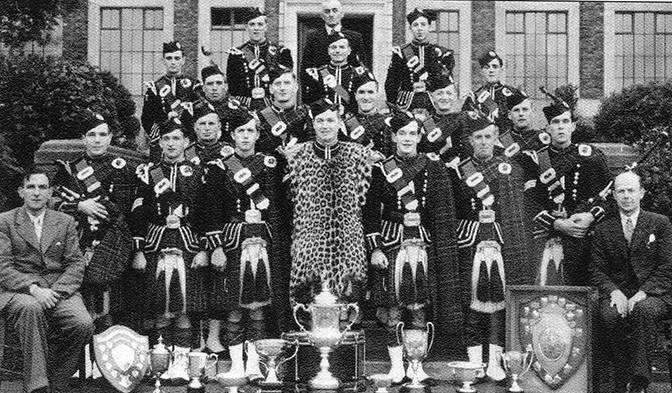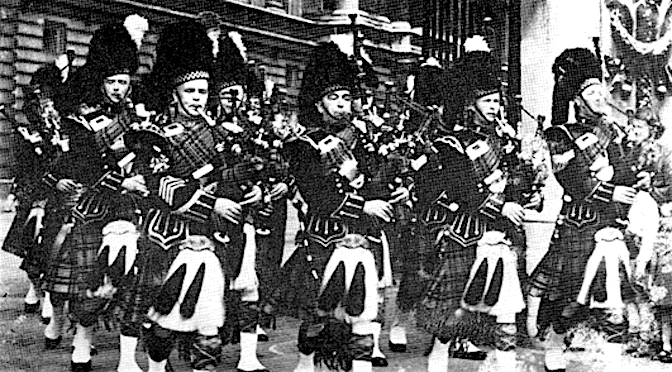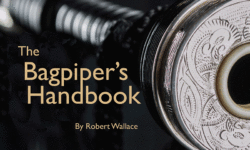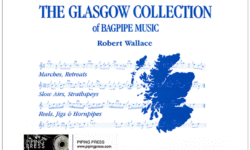
We conclude our look back at the history of the RSPBA as described in an edition of the Piping, Drumming and Highland Dancing Journal of 1949. The author, Mr RC Whitelaw, Secretary of the then Scottish Pipe Band Association, turns his forensic eye on the establishment of a pipe band college and problems with judging as he saw it. Pictured are Bowhill Colliery Pipe Band, Fife, winners of the first SPBA World Pipe Band Championship in 1947. The picture is included as it is contemporaneous with this article and, given our headline, should not be taken as a slight on this band’s historic achievement.
In so far as pipe bands are concerned, the setting up of two separate schools may seem to thwart our objective in combining pipes and drums into one unit. That is not so, because I think a transitional period is necessary to bridge the gap between the overthrow of the old method and the establishment of the new.
I am satisfied that in the near future this segregation will solve itself and instead of having two schools, one of piping and one of drumming, we will find a joint effort culminating in our great ambition – a Pipe Band College. Only in such a college can our ideals be brought to fruition.
The foremost thought in our minds at this stage will be the quest to know what lies behind the issuing of certificates to tested and proved pipers and drummers. There will certainly be a demand for certificated teachers for pipe bands.
Our objective, subsequent to the certification of teachers, will be setting up of a school in each Branch area and only a qualified and certificated teacher will be allowed to take control of each school. The more enthusiastically we promote the certification of teachers, the sooner will we have these schools in operation.
The scheme of mutual aid, encouragement and support will soon be manifest, and our colleagues who have struggled for so many years to keep up the tradition of pipe bands will now find that the Association is at last assisting all who are anxious and willing to advance the culture of pipe band technique.
The foregoing relates specifically to the present and immediate future problems of the Association, but there are still many aspects in our Arts which must be considered when framing future policy. Among the foremost of these is contest judging.
At the moment this is not problematic, it is just tragic. If, as I have already stated, the control of teaching must be our primary consideration, then it logically follows that judging will have to be similarly treated.

Whenever I have the opportunity, I behold the centre of the contest arena and my eyes are distracted, nay distressed, by the sight of two or three small buildings, not unlike the bathing huts on a crowded beach, in which sit the judges.
There, with points pads in front of them, each one in his own little prison, they decide the fate of the contestants. Besides giving points, including aggregates, they are expected to give criticisms on the spaces provided in the pads of each ‘band performance’. This whole scheme is farcical.
Here we have two or three judges sitting a few yards apart, and hidden from each other, each trying to separate his own particular instrument – pipes or drums – and reach a decision. How can any man conscientiously and honestly separate in detail piping and drumming in a pipe band contest?
‘Any person can reach a decision, but is that decision consistent with the combined effort of the performers?’
RC Whitelaw, SPBA Secretary
The one instrument MUST influence the other. This system of judging has added considerably to the failure of a joint effort. It should be remembered that neither of the judges understands each other’s instrument or method, yet they reach a decision affecting the entire band. Any person can reach a decision, but is that decision consistent with the combined effort of the performers?
I completely disagree with this procedure and feel convinced that our judges must be brought into line with the progress and advancement of the pipe band. We must insist on their being absolutely and fully qualified and efficient, and kept up-to-date in all matters affecting pipe band progress.
They must be able to give the benefit of their skill and experience to the School or the College, and play a full part in its advancement. Nothing less than proved efficiency will satisfy the bands today and it behoves the Association to ensure that the bands are satisfied. I could develop this subject further.
Suffice is for the moment to submit one item of proof. Just try to imagine a brass band contest being judged by six or seven judges, one for each instrument – cornet, trombone, etc. Yes, just try to imagine it and leave it at that!! Such a farce would never be countenanced in any sphere of music other than pipe band contests.
‘…Some of the judges will declare war on me for this article’
RC Whitelaw
Why must we go on year after year believing that men operating like poles apart, and diametrically opposed to each other’s way of thinking, can arrive at a true estimate of a combined effort? The very fact that they accept the responsibility of judging implies that they are, or should be, fully qualified to arrive at correct decisions.
I know that many people, including some of the judges, will declare war on me for this article. I am armed for any onslaught. We must face the facts. Somebody must take up the cudgel and destroy this ridiculous state of affairs. By so doing, we will introduce a system worthy of our efforts. I pin my faith unconditionally to education and teaching.
The more we encourage and develop the School and the College, the sooner we will be able to mark our progress. Let us therefore set ourselves the task of applying the first part of our future policy and go forward, not by learning the lessons from our past misdeeds, but by the introduction of a policy worthy of the great instruments we proudly acclaim – pipes and drums.





















